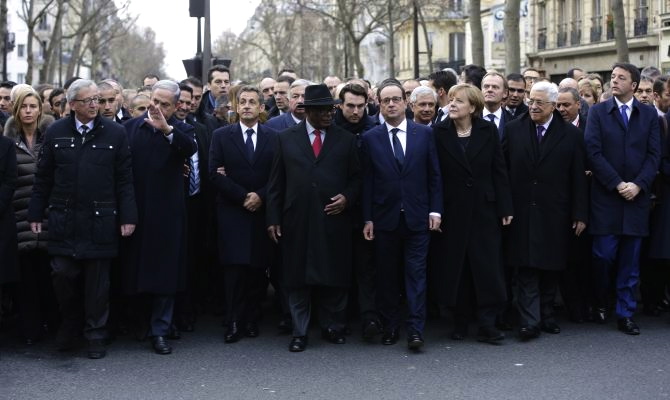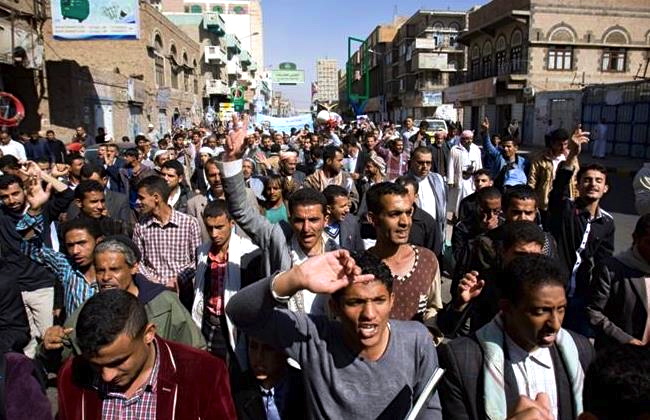 Photo credit to Philippe Wojazer/Reuters.
Photo credit to Philippe Wojazer/Reuters.
 Photo credit to Hani Mohammed/AP.
Photo credit to Hani Mohammed/AP.
What do these two photos have in common?![]()
![]()
More than you might think.
The former is, of course, a near-instantly famous photo of French president François Hollande marching on the streets of Paris earlier today arm in arm with dozens on European and other world leaders, demonstrating the solidarity and unity of the French people (and their allies) in the wake of last Tuesday’s attack on satirist magazine Charlie Hebdo, which killed 12 people, and another attack on a kosher supermarket that killed four more people.
From left to right, you can see Federica Mogherini, the European foreign policy chief; Jean-Claude Juncker, the European Commission president; Israeli prime minister Benjamin Netanyahu; former French president Nicolas Sarkozy; Malian president Ibrahim Boubacar Keïta; Hollande; German chancellor Angela Merkel; European Council president and former Polish prime minister Donald Tusk; Palestinian Authority president Mahmoud Abbas; and Italian prime minister Matteo Renzi. Not pictured are other luminaries, including British prime minister David Cameron, Jordanian King Abdullah, Greek prime minister and Spanish prime minister Mariano Rajoy and others, not all of whom are necessarily known for their staunch defense of freedom of expression, speech and the press at home.
The march was widely covered in world and US media today.
But the second photo was taken just hours earlier in Sanaa, the capital of Yemen, where protests have erupted in the wake of another attack, also last Tuesday, that killed 37 people when a suicide bomber targeted a police academy, one of several instances of increasing violence in Yemen. Though they didn’t have the benefit of a phalanx of world leaders, the civilian marches in Yemen are no less important than those in Paris today.
US coverage of Yemen’s growing instability pales in comparison to that of the Charlie Hebdo attacks in Paris or even the ongoing sectarian struggles in Syria and Iraq. That’s understandable, to a degree — American readers relate more immediately to an attack on a Western city like Paris than yet another clash in a city in far-off Yemen.
But the two are related, especially as more links come to light between the gunmen responsible for this week’s tragedy in Paris and Al-Qaeda in the Arabian Peninsula (AQAP), which is emerging with greater strength as Yemen slips further into governance anarchy. Unlike the Islamic State group (الدولة الإسلامية) that is fighting to create a caliphate in eastern Syria and western Iraq, AQAP has much more vocally broadcast its goal to launch attacks against the United States and Europe. AQAP took credit for the Charlie Hebdo attacks, and the Kouachi brothers, two of the gunmen responsible for the atrocities, allegedly spent time in Yemen.
Even as France engages a debate about its five-million strong Muslim population, and the far right calls for a halt to immigration, there’s no real sign that anyone is discussing a foreign policy response that contemplates a more stable, secure, prosperous Yemen — home to the AQAP jihadists that have been at the heart of several attempted terrorist attacks in the United States in Europe in recent years.
It’s hard to summarize decades of complex history and context since south Arabia emerged from tribal and colonial rule in the 1960s, but the latest chapter begins with the Arab Spring era protests in March 2011 and an assassination attempt that injured former president Ali Abdullah Saleh, who took power in the northern Yemen republic in 1978, when the country was divided into two, the Aden-based government of the South Yemen a Marxist dictatorship sympathetic to Moscow.
Saleh engineered the hasty merger of the two Yemens in 1990, which in turn led to a bloody civil war throughout the following decade. His rule in the 2000s was marked by internal rebellion in both the north and the south and prodding from the United States to rein in AQAP radicals operating throughout Yemen.
Though Saleh stepped down in 2012, ceding power to his longtime vice president, southerner Abd Rabbuh Mansur Hadi, a former South Yemeni general who abandoned the Marxist government in 1986, is losing grasp of power in Yemen — a relatively ungovernable country, as countries go, with a tradition of decentralized control among its various tribes.
In September, Houthi rebels from the north, who adhere to the Zaidi variant of Shi’a Islam (almost exclusively Yemeni and about as close to Sunni Islam as any Shi’a branch), took control of the capital. Since then, AQAP has doubled down on its raids against Houthi and government rule. While Shiite-led Iran and the Sunni kingdom of Saudi Arabia are believed to be funding, respectively, the Houthi rebels and AQAP-sympathetic counter-rebels, Hadi’s government has withered in the face of attacks and reprisals from both groups.
To make matters worse, neither AQAP or Houthi partisans particularly love the United States, and both bitterly oppose unmanned drone strikes that have killed dozens of suspected (and rarely confirmed) AQAP militants, mostly in southern Yemen. Opponents claim that the strikes, more often than not, kill innocent civilians, including an innocuous wedding party in December 2013. To the extent that drone strikes have been at the heart of US anti-terror efforts for the past half-decade, the danger is that US efforts have only engendered greater anti-American and anti-Western antipathy. To the extent that, for much of the 2000s, US anti-terror policy involved deployed large amounts of aid to the Saleh administration, Saleh spent much of that aid fighting Houthi rebels in the north and Marxist holdouts in the south, not eliminating AQAP jihadists (who were often useful allies in the unified Yemen to subdue Marxists in the late 1990s and 2000s).
But the growing anarchy since the Houthi takeover of Sanaa in September (Hadi quickly signed a ‘power-sharing’ deal with the rebel forces) has left ordinary Yemenis reeling. In the weekend’s protests, they decried against all three groups — Hadi’s government, AQAP and the Houthi rebels.
It’s not that US or European incompetence in Yemen directly led to the Charlie Hebdo attacks. But what should be clear is that, even with so much more Western attention on Islamic State than AQAP, US policy in Yemen isn’t working. As the country falls ever closer to civil war, US policy may have actually facilitated the failed-state conditions that are now accelerating in Yemen.